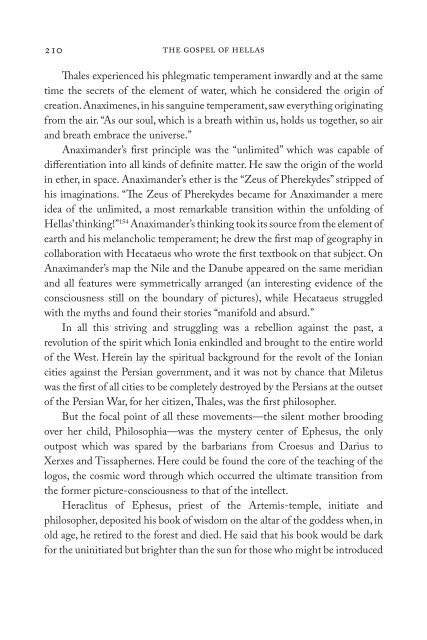The Gospel of Hellas - Research Institute for Waldorf Education
The Gospel of Hellas - Research Institute for Waldorf Education
The Gospel of Hellas - Research Institute for Waldorf Education
You also want an ePaper? Increase the reach of your titles
YUMPU automatically turns print PDFs into web optimized ePapers that Google loves.
0 the gospel <strong>of</strong> hellas<br />
Thales experienced his phlegmatic temperament inwardly and at the same<br />
time the secrets <strong>of</strong> the element <strong>of</strong> water, which he considered the origin <strong>of</strong><br />
creation. Anaximenes, in his sanguine temperament, saw everything originating<br />
from the air. “As our soul, which is a breath within us, holds us together, so air<br />
and breath embrace the universe.”<br />
Anaximander’s first principle was the “unlimited” which was capable <strong>of</strong><br />
differentiation into all kinds <strong>of</strong> definite matter. He saw the origin <strong>of</strong> the world<br />
in ether, in space. Anaximander’s ether is the “Zeus <strong>of</strong> Pherekydes” stripped <strong>of</strong><br />
his imaginations. “<strong>The</strong> Zeus <strong>of</strong> Pherekydes became <strong>for</strong> Anaximander a mere<br />
idea <strong>of</strong> the unlimited, a most remarkable transition within the unfolding <strong>of</strong><br />
<strong>Hellas</strong>’ thinking!” 154 Anaximander’s thinking took its source from the element <strong>of</strong><br />
earth and his melancholic temperament; he drew the first map <strong>of</strong> geography in<br />
collaboration with Hecataeus who wrote the first textbook on that subject. On<br />
Anaximander’s map the Nile and the Danube appeared on the same meridian<br />
and all features were symmetrically arranged (an interesting evidence <strong>of</strong> the<br />
consciousness still on the boundary <strong>of</strong> pictures), while Hecataeus struggled<br />
with the myths and found their stories “manifold and absurd.”<br />
In all this striving and struggling was a rebellion against the past, a<br />
revolution <strong>of</strong> the spirit which Ionia enkindled and brought to the entire world<br />
<strong>of</strong> the West. Herein lay the spiritual background <strong>for</strong> the revolt <strong>of</strong> the Ionian<br />
cities against the Persian government, and it was not by chance that Miletus<br />
was the first <strong>of</strong> all cities to be completely destroyed by the Persians at the outset<br />
<strong>of</strong> the Persian War, <strong>for</strong> her citizen, Thales, was the first philosopher.<br />
But the focal point <strong>of</strong> all these movements—the silent mother brooding<br />
over her child, Philosophia—was the mystery center <strong>of</strong> Ephesus, the only<br />
outpost which was spared by the barbarians from Croesus and Darius to<br />
Xerxes and Tissaphernes. Here could be found the core <strong>of</strong> the teaching <strong>of</strong> the<br />
logos, the cosmic word through which occurred the ultimate transition from<br />
the <strong>for</strong>mer picture-consciousness to that <strong>of</strong> the intellect.<br />
Heraclitus <strong>of</strong> Ephesus, priest <strong>of</strong> the Artemis-temple, initiate and<br />
philosopher, deposited his book <strong>of</strong> wisdom on the altar <strong>of</strong> the goddess when, in<br />
old age, he retired to the <strong>for</strong>est and died. He said that his book would be dark<br />
<strong>for</strong> the uninitiated but brighter than the sun <strong>for</strong> those who might be introduced

















